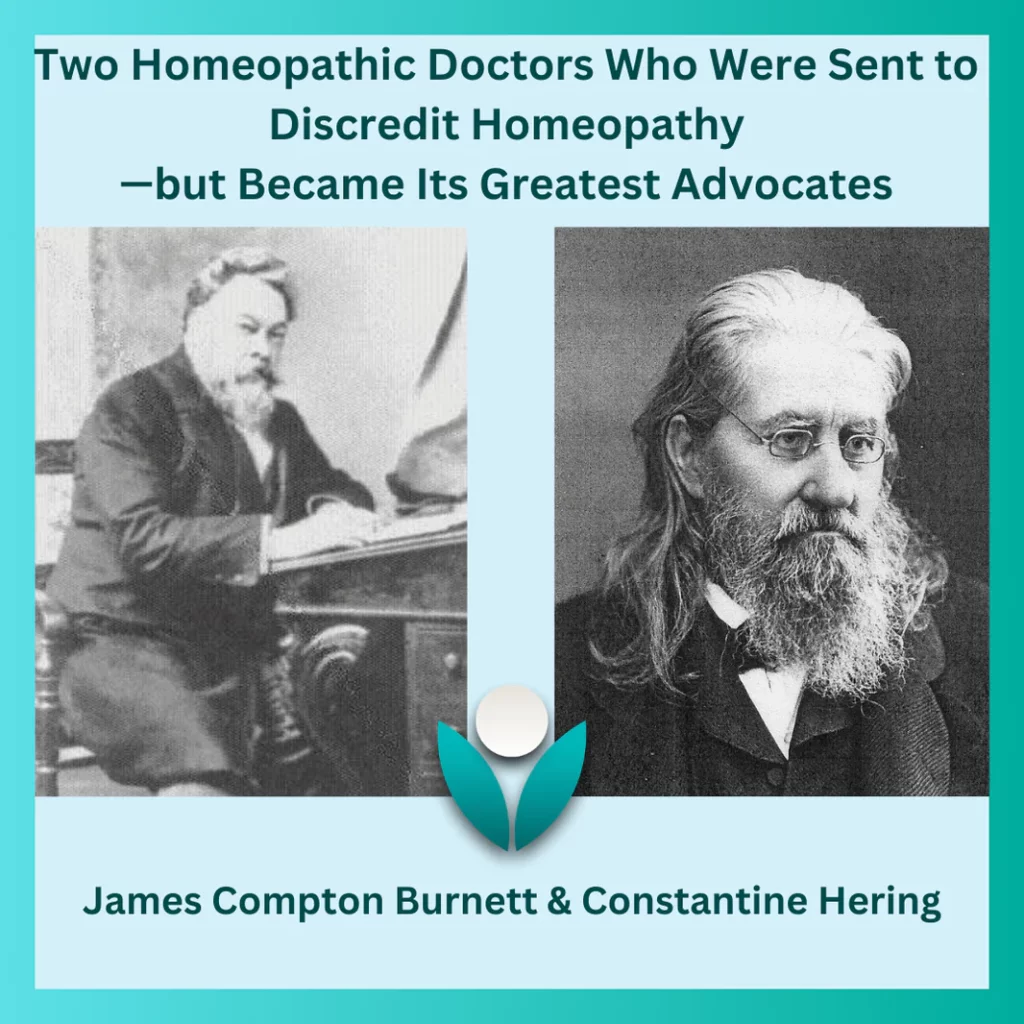Two Homeopathic Doctors Who Were Sent to Discredit Homeopathy—but Became Its Greatest Advocates
Homeopathy has long been a subject of skepticism within the broader medical community. Yet, some of its staunchest advocates were once its harshest critics. Two remarkable homeopathic doctors—James Compton Burnett and Constantine Hering—are prime examples of individuals who were sent to debunk homeopathy but were ultimately converted by its undeniable efficacy. Their journeys not only transformed their personal lives but also shaped the trajectory of homeopathic medicine worldwide.
James Compton Burnett: From Skeptic to Homeopathic Devotee
James Compton Burnett, a renowned British homeopathic doctor, had a storied medical career that spanned across traditional and alternative medicine. Born in 1840, Burnett initially followed a conventional medical path, graduating from the University of Vienna Medical School in 1865 and later from Glasgow Medical School in 1876. Early in his career, Burnett was disillusioned with the standard allopathic model of medicine and even entertained the idea of abandoning medicine altogether to become a farmer.
Burnett’s skepticism of traditional medicine, coupled with his frustration with the limitations of allopathic practices, led him to homeopathy. It was in 1872 that his life took a pivotal turn. Under the mentorship of Alfred Edward Hawkes, a prominent British homeopathic physician, Burnett was introduced to the world of homeopathic medicine.
Initially, Burnett approached homeopathy with a healthy dose of skepticism. In fact, he decided to test the system under clinical conditions, conducting a trial that would either validate or disprove homeopathy once and for all. Inspired by the works of Richard Hughes, Burnett read Hughes’ writings on therapeutics and pharmacodynamics. Hughes recommended Aconite as a treatment for simple fever, and Burnett decided to test it.
In the ward where Burnett was in charge, he administered Aconite to half of the patients, while the other half received no treatment as the control group. His intent was clear: to prove homeopathy a “lying sham” and expose it to the medical community. But the results were nothing short of astounding. The patients who received Aconite recovered swiftly, while those who did not showed little improvement. Even the nurse-in-charge, moved by the results, began administering the remedy to the remaining patients. Burnett, “simply dumbfounded,” was struck by the undeniable efficacy of homeopathy.
This clinical experience, which Burnett later likened to a religious conversion, transformed him into one of homeopathy’s most fervent advocates. He dedicated the rest of his career to promoting the principles of homeopathy, writing extensively on the subject and working to spread the practice.
Constantine Hering: The Father of American Homeopathy
While Burnett’s journey from skepticism to advocacy is compelling, it is far from unique. Constantine Hering, often referred to as the “Father of American Homeopathy,” offers a similarly transformative story. Born in 1800 in Germany, Hering trained as a conventional physician, studying traditional medicine before encountering homeopathy. Early in his career, Hering was skeptical of the burgeoning system of homeopathic medicine, which was gaining momentum in Europe. In fact, his medical colleagues sent him to America with the mission of discrediting homeopathy once and for all.
However, Hering’s encounter with homeopathy in the United States would have the opposite effect. While visiting a homeopathic clinic, Hering observed firsthand the success of homeopathic treatments, especially for chronic conditions that conventional medicine had no answers for. What struck him most was the speed, gentleness, and effectiveness of the remedies. Unlike the invasive and often harmful treatments of traditional medicine, homeopathy worked with the body’s natural healing processes, stimulating recovery without adverse side effects.
This pivotal experience caused Hering to re-evaluate his views on homeopathy. He quickly became not only a homeopathic practitioner but also one of its most passionate advocates. Hering dedicated the rest of his life to advancing homeopathy in the United States, working tirelessly to establish its credibility. His research on provings—the clinical trials in which healthy individuals ingest a substance to observe its effects—played a crucial role in developing homeopathy’s materia medica.
The Transformation of Skeptics into Advocates
Both James Compton Burnett and Constantine Hering were sent to disprove homeopathy. Instead, they became two of the system’s most passionate and influential advocates. Their stories are not just historical footnotes; they serve as a testament to the power of homeopathy and its ability to change lives. For anyone considering becoming a homeopath, Burnett and Hering’s journeys offer inspiration. Their stories illustrate that the path to homeopathy is not just about learning medical theory—it’s about experiencing firsthand the incredible healing potential of homeopathic remedies.
In today’s world, where interest in alternative medicine and holistic health is growing, the ability to study homeopathy online has made it easier than ever to follow in the footsteps of these pioneers. With CCHM’s online homeopathy courses, students have the opportunity to learn at their own pace and from anywhere in the world.
Moreover, as more and more people look to natural and gentle remedies for healing, the need for skilled, compassionate homeopaths continues to grow. For those interested in studying homeopathy and pursuing this rewarding career, with a CCHM homeopathy diploma and a heart dedicated to healing, you will be well-equipped to carry on the transformative work of these early homeopathic pioneers.

Other Articles
Begin Your Homeopathy Journey Today!
Our programs are designed to provide you with the comprehensive education, hands-on experience, and ongoing support needed to thrive in your new career as a healer.
